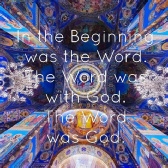



 NEXT
NEXT
 BACK
BACK
 Forum
Forum


Philosophical musings on Quanta & Qualia; Materialism & Spiritualism; Science & Religion; Pragmatism & Idealism, etc.





LOGOS
The Mystery of How We Make Sense of the World
Raymond Tallis
Physician & Philosopher
“The eternal mystery of the world is its comprehensibility”
___Albert Einstein
Post 99. September 16, 2019
LOGOS Makes Sense
Logos versus Mythos
. . . The Jews had developed a concept of the “Word” of God as a magical creative incantation, as demonstrated in the Creation Story, when the phrase “let there be light” began the process of causing a beautiful garden to emerge out of a dark watery abyss, like a rabbit from a hat. Later, the author of John’s gospel made the connection between the Greek term for “force of reason” and their own notion of “divine command”. But he reified the abstract “Logos” as an actual personal god, and helped to create a totally new religion based on theological beliefs rather than communal ceremonies.
Tallis goes on to distinguish the Greek concept of Logos from Mythos. The Mythos of the common people assumes that erratic world events are due to the whims of capricious humanoid gods. But the Logos of philosophers implies that, despite the serendipity of events, they are predestined by the will of a single mind with a long-
Although Dr. Tallis doesn’t take seriously the traditional stories of a creator god, he can’t avoid addressing the concept of a universal mind of some kind. “The intuition or idea of The Universe brings with it the notion of a universal, informing intelligence. This alone makes it mind portable.” However, he continues, “it leaves us with a challenge that we must address in the chapters that follow : to find a basis for the intelligibility of the world without invoking an informing intelligence permeating the world and reflected in our minds.” But why avoid such an intuitive and “mind portable” solution to the “overwhelming astonishment” that provoked his essay into the reason for reason. In the Enformationism thesis, I finally gave-
In the addendum to a chapter on the Logos concept, Tallis again presents the theme of his book : “Philosophers whose ambition is to uncover the Logos of the world without Mythos.” In other words, to present a reasoned assessment without pandering to irrational emotions. That would be an abstract academic theory, in the form of “the view from nowhere and no-
End of Post 99
4. The Great Programmer :
See Evolutionary Program-
5. Objectivity :
Tallis wonders if God ever intended for his creatures to be rational, dispassionate thinkers. If so, he asks, “what went wrong? Adam wanted to know what God knew and so become god-
Logos as God
